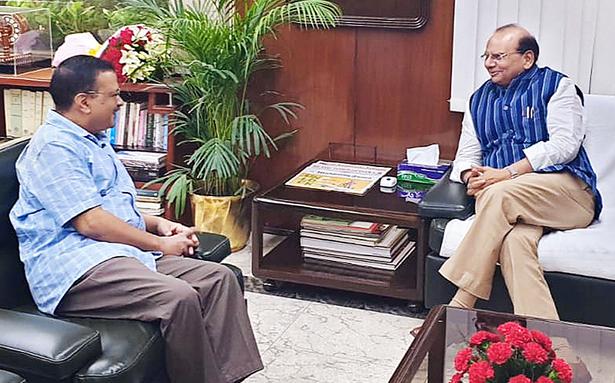In May, a three-judge Bench led by Chief Justice Ramana had, in a judgment, referred to a Constitution Bench the limited question concerning ‘services’ or bureaucracy for an authoritative pronouncement
In May, a three-judge Bench led by Chief Justice Ramana had, in a judgment, referred to a Constitution Bench the limited question concerning ‘services’ or bureaucracy for an authoritative pronouncement
A Constitution Bench led by Justice D. Y. Chandrachud on Tuesday agreed to start hearing from November 9 the dispute between the Centre and Arvind Kejriwal-led Delhi government for control over bureaucrats in the Capital.
In May, a three-judge Bench led by Chief Justice Ramana had, in a judgment, referred to a Constitution Bench the limited question concerning ‘services’ or bureaucracy for an authoritative pronouncement.
Explained | The administrative services row between the Delhi and Central governments
Four years ago, another Constitution Bench had unanimously held that the Lieutenant Governor of Delhi was bound by the “aid and advice” of the popularly-elected Aam Aadmi Party (AAP) government and both had to work harmoniously with each other. It had noted that there was no room for anarchy or absolutism in a democracy.
However, the 2018 judgment had not specifically dealt with the issue of ‘services’.
The National Capital Territory government had compared its predicament without power over the ‘services’ like that of a king without a kingdom. The situation was such that a “democratic representative government” had to get the approval of the Lieutenant Governor to appoint a Health Secretary or a Commerce Secretary, it had argued.
The 2018 judgment had made it clear that the powers of the Centre and the Delhi government were collective and coextensive, Mr. Singhvi had submitted.
“What collective responsibility will the Delhi government have without the power to control the transfers and postings of the officers? Federalism is itself being eroded,” the senior lawyer had argued.
Mr. Mehta had contended in favour of referring the issue to a Constitution Bench.
Centre wants Delhi under its control
The Centre had argued that Delhi, the nation’s capital and a sprawling metropolis, should be under its control. Delhi could not be left to the “small mercies and smaller resources” of a State legislature, the Centre reasoned.
On February 14, 2019, a Supreme Court Bench of Justices A.K. Sikri and Ashok Bhushan (both retired) had given a split opinion on the question of control over ‘services’ in the Capital.
While Justice Bhushan had held that the Delhi government had no power over ‘services’, Justice Sikri, who was the lead judge on the Bench, had opined that files on transfers and postings of officers in the rank of secretary, head of department and joint secretary could be directly submitted to the Lieutenant Governor.
As far as DANICS (Delhi Andamans Nicobar Islands Civil Service) cadre was concerned, the files could be processed through the Council of Ministers led by the Chief Minister to the Lieutenant Governor, Justice Sikri had written.
The Delhi government has separately sought the quashing of amendments to the ‘Government of National Capital Territory of Delhi (GNCTD) Act’ and 13 Rules of the ‘Transaction of Business of the Government of National Capital Territory of Delhi Rules, 1993’.
It has contended that the amendments violate the doctrine of basic structure of the Constitution and that the Centre, through these changes, has given more power to the Lieutenant Governor than the elected government of the people of Delhi.


